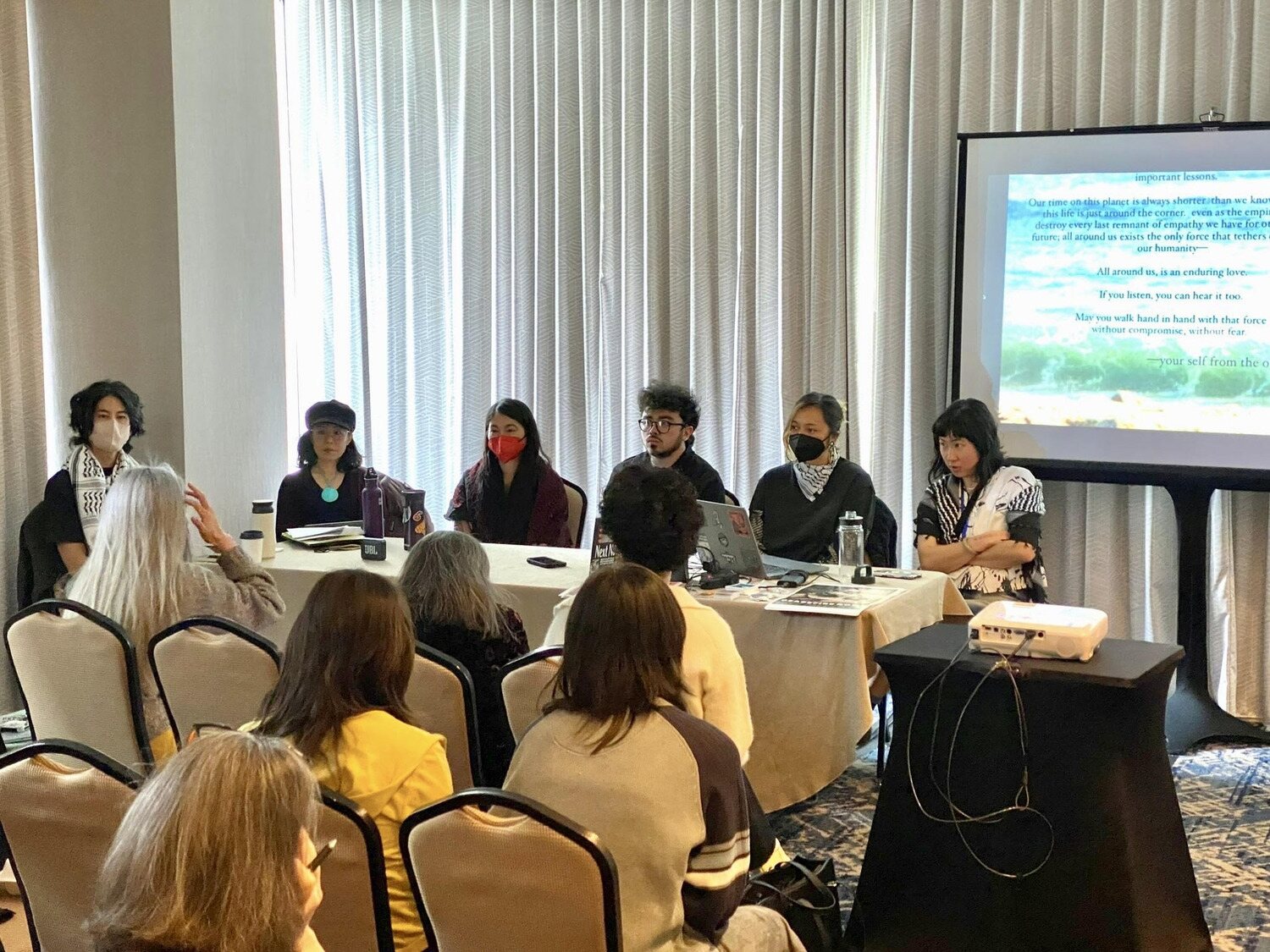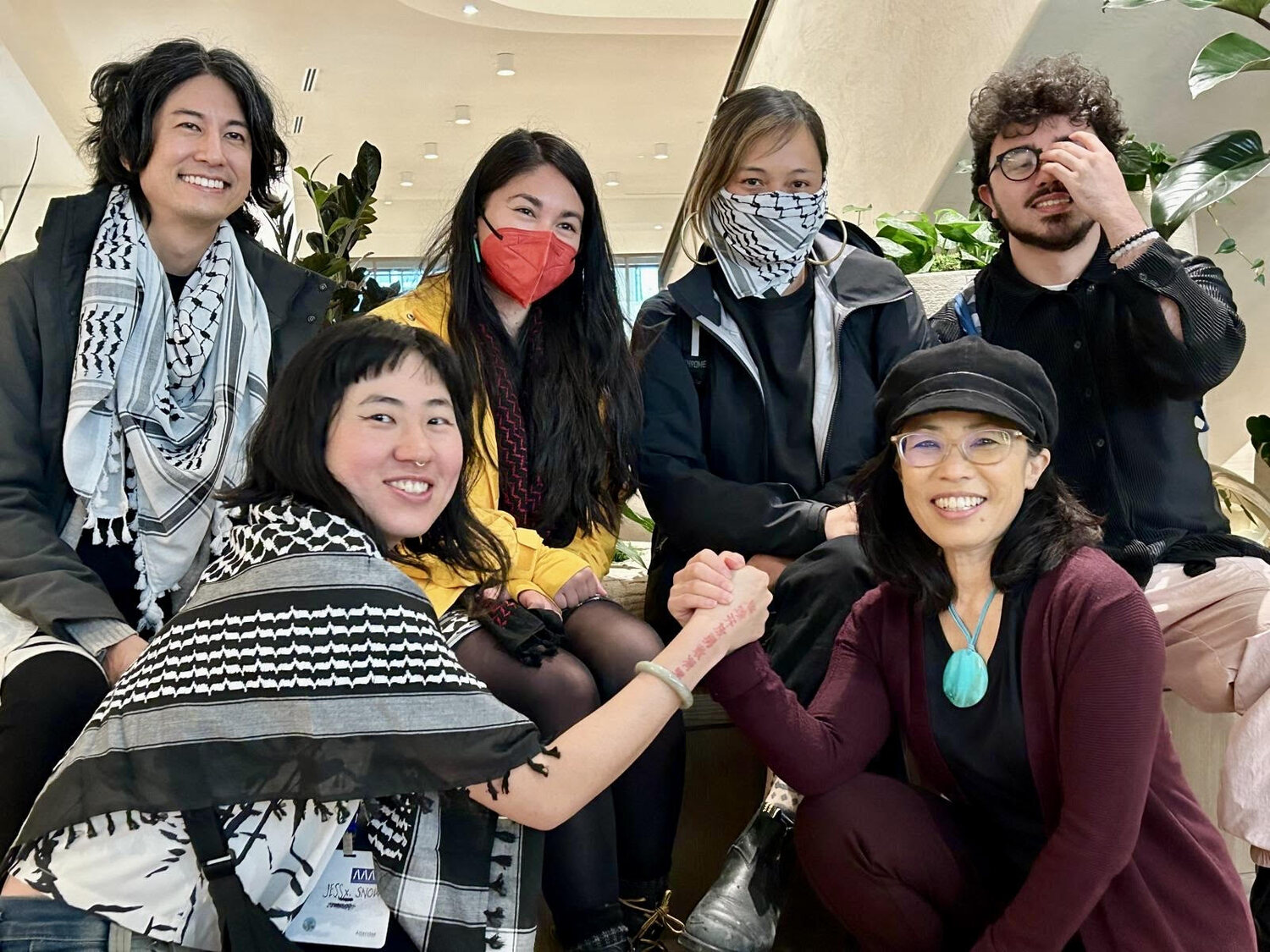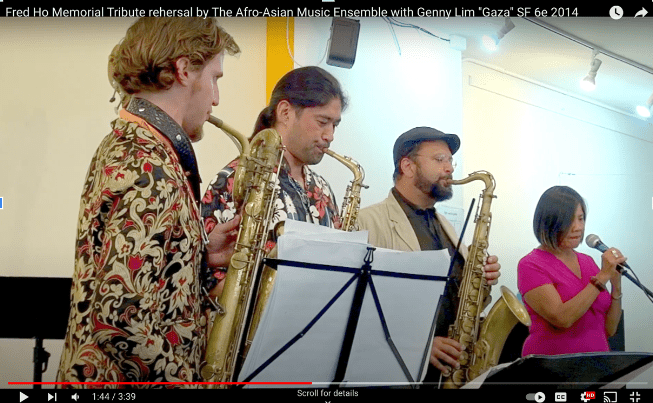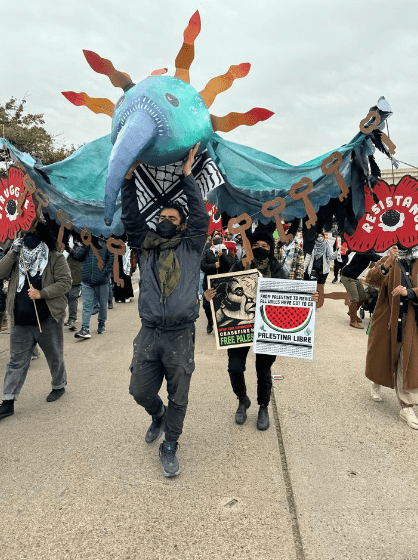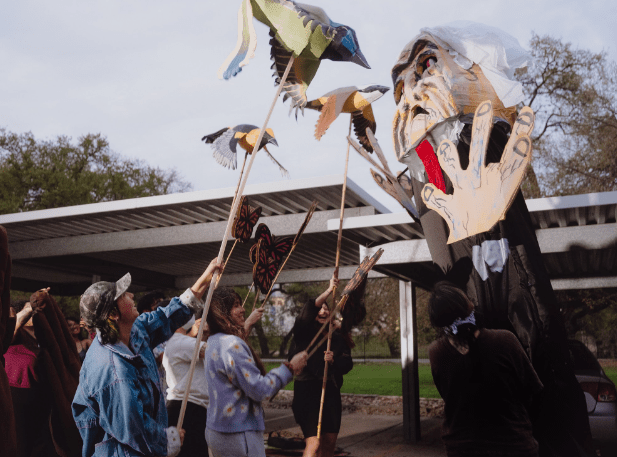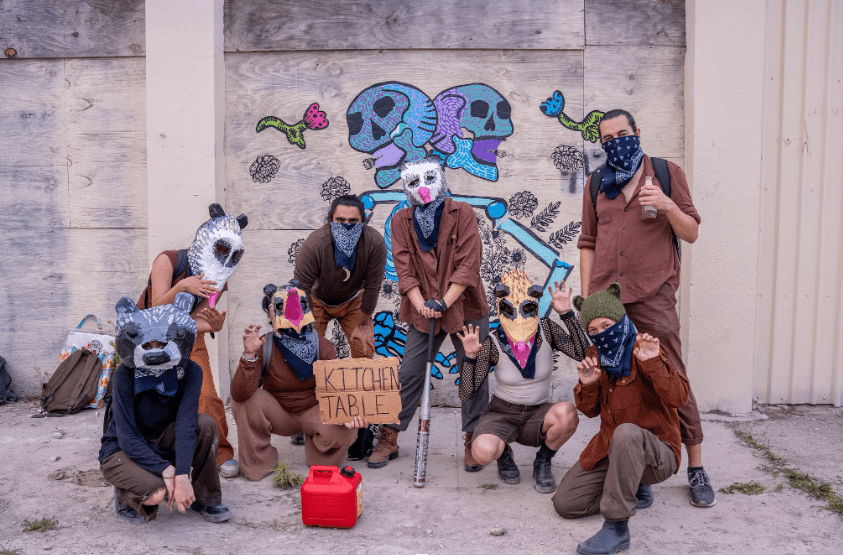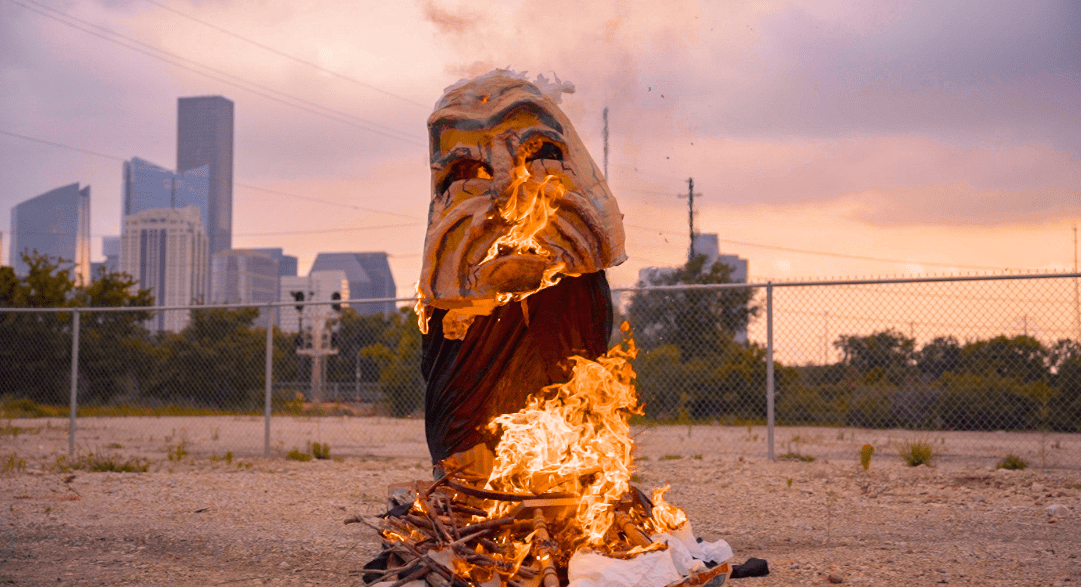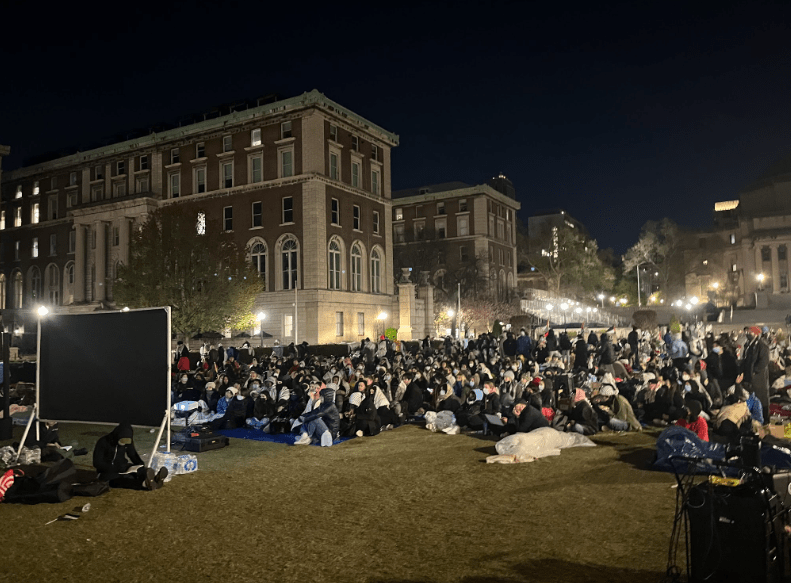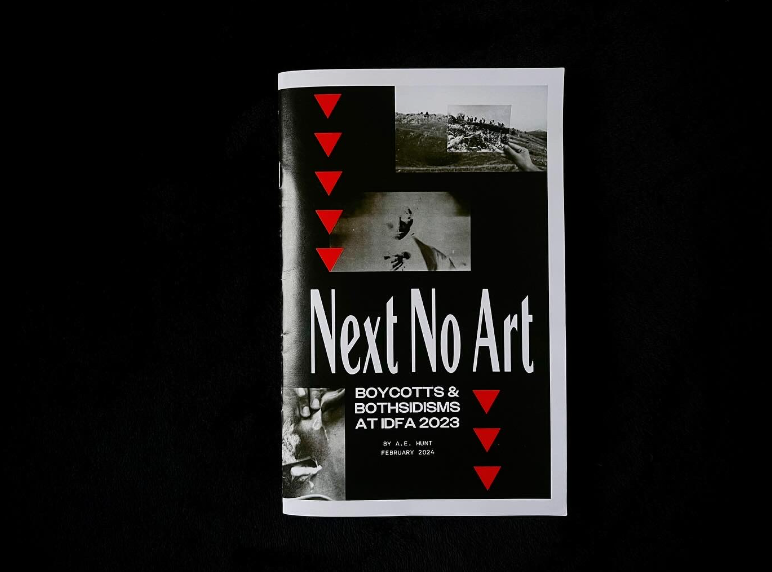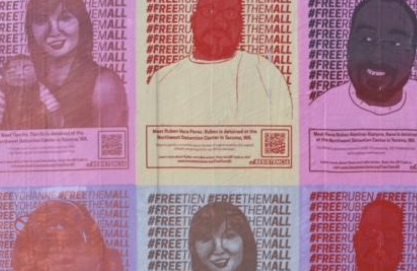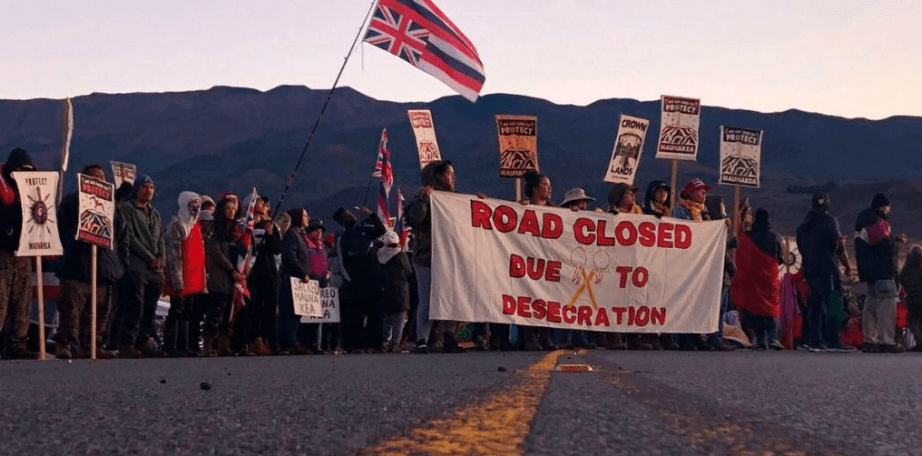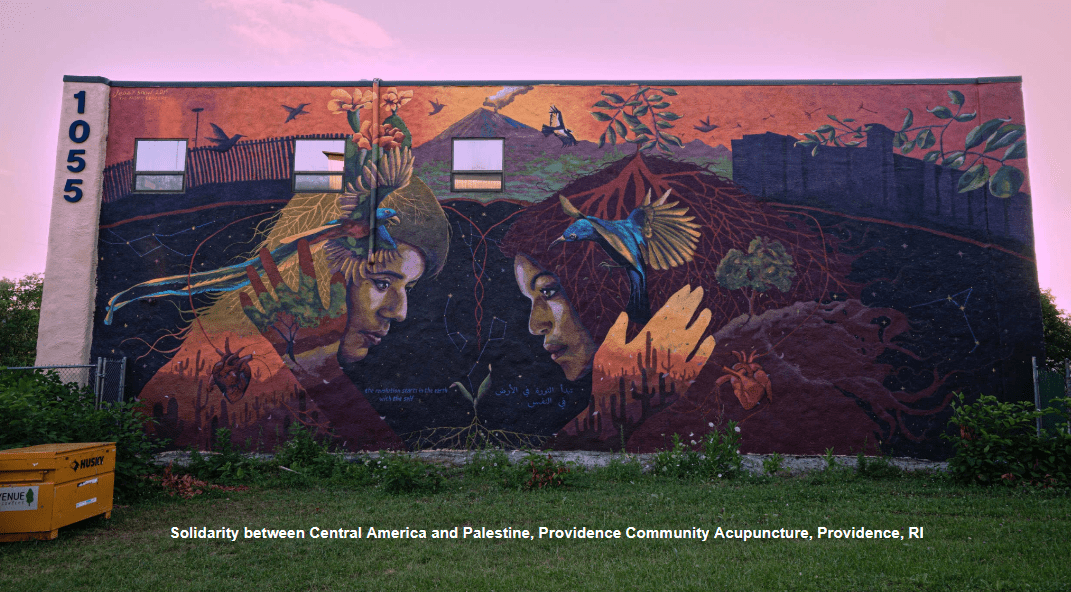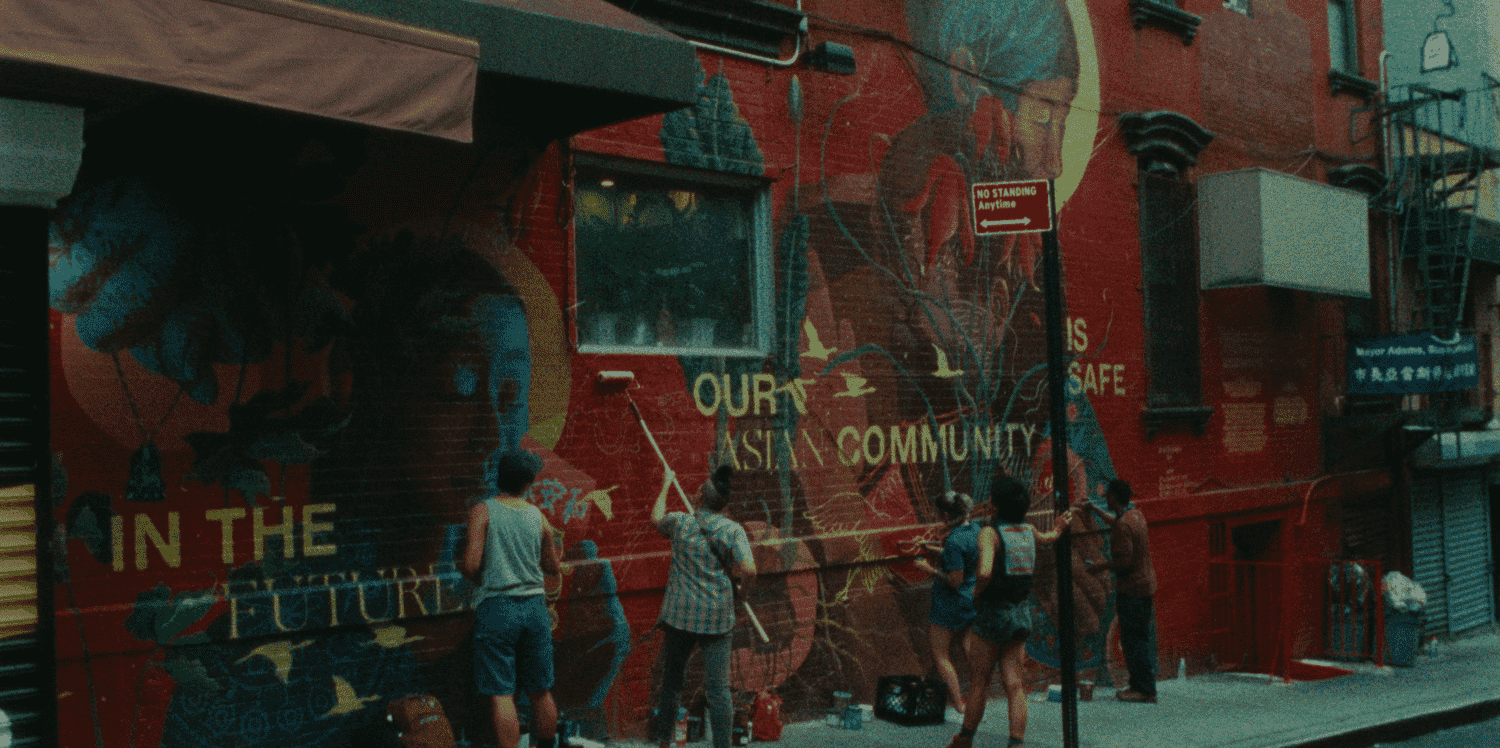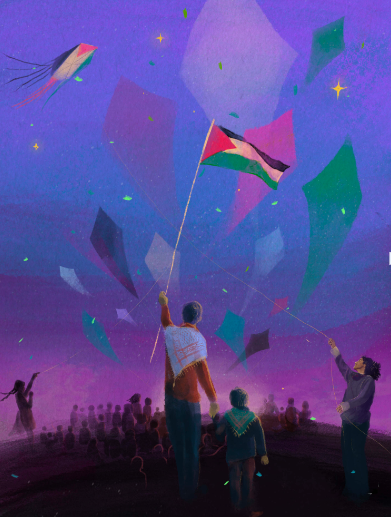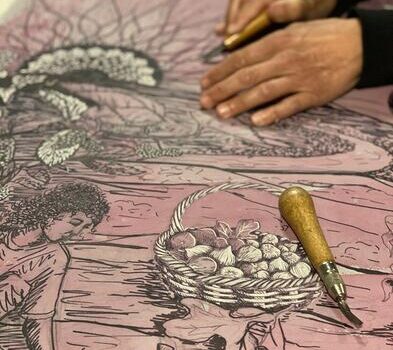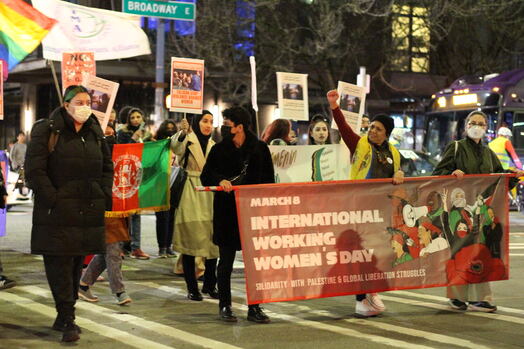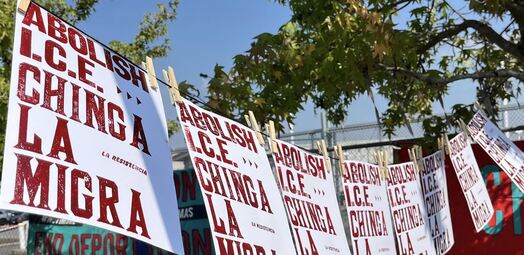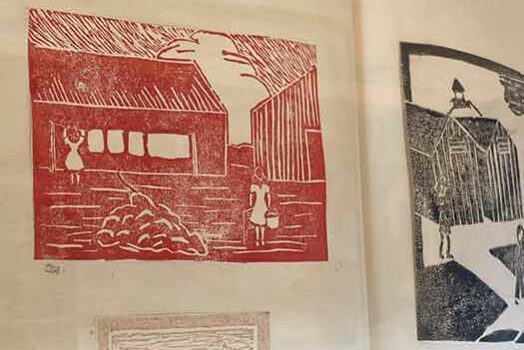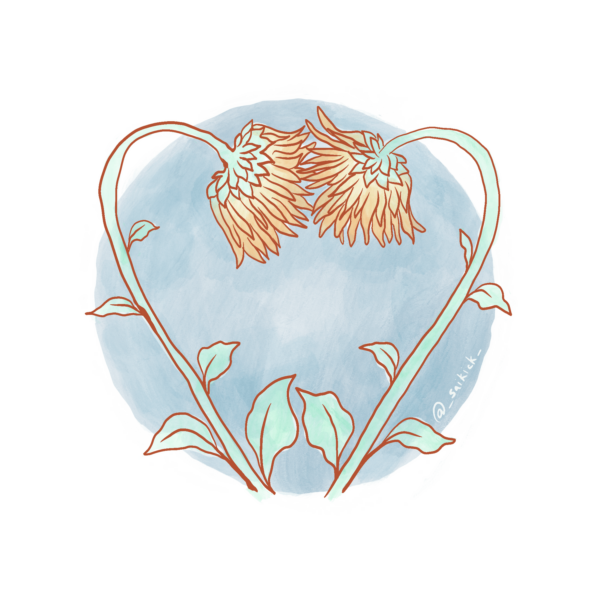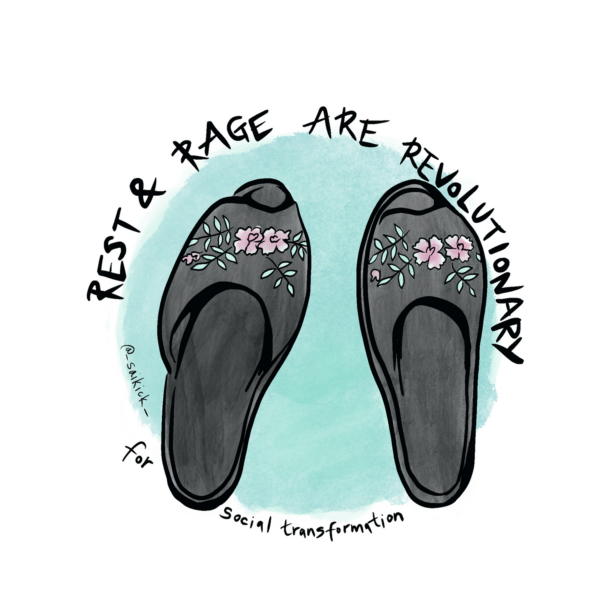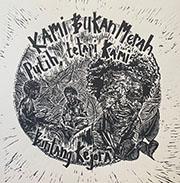The Association
This started as a thank you post that turned into a letter and synopsis because knowledge gained can be knowledge shared. Last September, Justseeds artist Jess X. Snow invited a group of us scholars, artists and filmmakers to devise a panel about our work for the Association for Asian American Studies (AAAS) Annual Conference. Little did we know what would transpire in the months after up until now, as much attention is on students around the United States organizing on their campuses and holding encampments to demand divestments from Zionist entities. Juxtaposed to an academic convening in a fancy hotel, throughout the weekend we questioned if this was the place we should be and if taking up this space with radical art and our movement experiences was what was needed.
AAAS was the first academic group to pass a resolution supporting the BDS movement and to boycott Israeli academic institutions during the 2013 conference in Seattle. Among the plethora of plenaries and programming at this year’s conference there was also a meeting to discuss $150,000 of funds ($50,000 over a three-year period) that was to be granted to AAAS by an organization that has a board member who is also part of the ADL (a prominent Zionist organization). During that meeting many reasons were brought up to not accept the funds or alternative ways to utilize those funds to directly support families fleeing Gaza. AAAS members ultimately decided to not accept the funds and continue to support the liberation of Palestinian people from Israeli settler occupation in other ways.
With much gratitude, I wish to celebrate and share some learnings and deep questions I am leaving with from our time together at AAAS.
Palestine Solidarity
The evening of Friday, April 26th, Jess and I were able to attend the Executive Board Plenary “Palestine and the Work of Solidarity in Asian American Studies” with Amira Jarmakani, Najwa Mayer, Umayyah Cable, Dana M. Olwan, Lila Sharif, and Mejdulene Bernard Shomali. Umayyah brought up a poignant message for me during that if we at all challenge what the students are currently organizing then we are challenging the very pedagogies there are being taught in Asian American Studies, Ethnic Studies, etc. Students are putting their learning of theories into praxis. Their clear demand is for their universities to divest from Zionism. They are being met with violent backlash as university authority figures collude with police. Students and faculty members are sacrificing their degrees, housing, and livelihoods in this fight against an ongoing U.S. government backed genocide against the Palestinian people.
Moreso for professors, the topic of mentorship also came up as a responsibility. Lila Sharif shared a story about the late revered Palestinian writer, poet, professor and activist Refaat Alareer, who was murdered in December 2023 under the Israeli occupation. Some of his students had tried to prank him by making a fake parking ticket on his car. The students watched him from afar as he approached his car and read the ticket, waiting for him to react. To their surprise he stood there staring at the paper for a long time, so they walked over and confessed they tried to pull a prank on him. Instead of scolding them he asked, “Which of you wrote this? You have the most beautiful handwriting. Have you ever considered becoming a writer?”
Some questions I was left with from this extensive conversation included: What are the anticolonial possibilities where the future is Palestinian? Is the Asian American Studies Field in the pursuit of revolution? How do we decenter and dismantle the seductive nature of identity in coalition building knowing full well certain groups are going to be more targeted by police violence?
Lit Café
That night we all accompanied Jess for the AAAS Lit Café that included an author and filmmaker panel of Mim Khúc, Jenny Lion, Susan Lieu, Cathy Linh Che and Jess X. Snow. We plastered up Justseeds and friends’ solidarity with Palestine posters and other art on the right wall of the room and had stickers and zines for sale. All the Palestine related art was sold for this fundraiser being circulated by Justseeds artist Sa’rah Farahat to support Palestinian families based in the Portland, Oregon area flee Gaza. (You can download free graphics in support of Palestine’s liberation on justseeds.org in the numerous Graphics Care Packages.)
Each panelist shared snippets of a film, poems or a chapter of their book that reflected on the Asian American experience of growing up with immigrant parents. I think many of us felt some deep affirmation to their experiences and stories. Particularly Mimi Khúc’s reading that challenges the debt children of immigrants feel like they owe to their parents and how the more “success” in alignment with repaying debts to our parents only adds to the surmounting debt. Jess and Cathy shared a clip from “Appocalips,” filmed by Jess in Vietnam, U.S., and the Philippines that was produced and written by Cathy (a Vietnamese American poet) and directed/edited by Christopher Radcliff. Appocalips is a multi-channel video installation based on the real-life experiences of poet Cathy Linh Che’s parents, two newly married Vietnam War refugees, who, in 1976, while stateless in a refugee camp in the Philippines, were hired to play extras in Francis Ford Coppola’s Apocalypse Now. Jess also shared a clip of their narrative short film “ROOTS THAT REACH TOWARD THE SKY” about Kai, a young botanist whose immigrant mother’s Chinese Traditional Medicine shop is vandalized and has to confront barriers of her own healing as her mother grieves and her muralist partner is on a mission for community catharsis. (Learn more about Jess’s narrative shorts.) In a world of endless grief, “Roots That Reach Toward The Sky” leans into child and parental dynamics, and queer love with the reminder that “We never have enough time with the ones we love.”
“We never have enough time with the ones we love.”
(from “Roots That Reach Toward The Sky”)
Ha:san
Saturday morning, I was able to attend a session called “Settler Colonialism in the Commemoration & Representation of Japanese American WWII Incarceration” with Jane Komori, Karen Leong, Koji Lau-Ozawa, Hana Maruyama, and Natasha Varner. I had the pleasure of meeting Koji the summer before during the Minidoka Pilgrimage, to revisit and learn more about ‘Hunt Camp’, the 33,000-acre site outside of Twin Falls, Idaho where 13,000 Japanese and Japanese Americans from Washington, Oregon and Alaska were incarcerated during WWII. (Learn more about the Minidoka Pilgrimage.) Koji’s presentation was titled “Ha:san in History: Multiple Manifestations in an Incarceration Camp”. He focused on the Gila River concentration camp where the Ha:san (saguaro cactus) has personhood for all O’otham people. During the years of incarceration, the Ha:san became more of a spiritual icon as people incarcerated attached paper charms (related to Shinto and Buddhist traditions). Many photos also demonstrate the awe people incarcerated alongside these towering cactuses they had not seen before being newly and forcibly relocated to the Sonoran Desert. Koji was told by his friend from the Salt River Pima Maricopa Tribe that the Ha:san witness and remember, “they probably remember your grandmother,” (who was incarcerated at Gila River War Relocation Center during WWII). As we continue to witness the loss and destruction of land by colonial and imperialist forces, this was a stark reminder to honor our nonhuman relatives who bear the burden of this destruction, who remember, witness, and maybe even feel what we are feeling too amidst all this grief.
Art for the People
Our panel on Saturday morning “Art for the People: Sustaining Community Practices from the 60s to the Future,” was composed of Diane Fujino, a. e. hunt, Justseeds artists: Kill Joy, Jess X. Snow, and (myself) Saiyare Refaei, and moderated by Chad Shomura. We wanted to share living proof of how radical collective imagination shows up in the art and cinema within social movements.
Diane Fujino opened with playing a minute of the powerful recording of Ben Barson, Masao Koga, Hafez Modirzadeh and Genny Lim of The Afro-Asian Music Ensemble with Genny Lim playing “Gaza” at the Fred Ho Memorial in San Francisco in 2014. Diane emphasized radical imagination and participatory pedagogies of the 1960s-80s Black Liberation and Asian American movements with an emphasis on not only community-based art making, but art-based community making. She reminded us that art is always linked to the political, that we must live the lives we want to see in the future and the importance of being connected to the people (humanizing martyrs and people incarcerated or detained.)
Kill Joy presented about lessons learned on the ground about the power of collaboration, especially with people who do not identify as “artists”, and how such collaborations can bridge transnational communities particularly between the Philippines, Mexico and the US. She recently founded Kitchen Table Puppets + Press where puppet land is an ideology. Recently, Kitchen Table Puppet + Press has been making an enormous sunbird puppet for Palestine solidarity marches and fundraiser events. as well as a More recently, for a procession against S.B. 4. they made monarch butterflies and many other puppets, including a giant puppet of Greg Abbot that the group later burned with Molotov cocktails in an abandoned lot. In community they are all working towards taking down the empire through time together that involves play, communal meals and loving life.
a. e. hunt presented on the old and new modes of film distribution and exhibition built outside of the Hollywood Studio system, such as the “Third Cinema” movements, and current radical cinema collectives like cinemóvil nyc who brought the 1968 documentary Columbia Revolt to the current encampment at Columbia followed by a skillshare. He illustrated how state-of-the-art cinema in community spaces can be paired with teach-ins, skill-shares, or fundraising.
Saiyare Refaei talked about their use of community art to activate spaces and solidarity for building bridges between movements. They shared context about their temporary mural “Re-Emerging in Healing” in 2018 that made connections for the immigrant detention center and illegal liquid natural gas facility in the Port of Tacoma. In 2020 they worked with La Resistencia to humanize people detained for a “Free Them All” poster campaign that what wheatpasted on the Henry Art Gallery on the University of Washtingon Seattle campus. And offered ways to be further inspired and organize in community such as the “Let This Radicalize You” workbook they illustrated in 2022 to accompany Mariam Kaba and Kelly Hayes’ publication with the same title.
Jess X. Snow shared a letter about re-learning how to love and dream during the most impossible times. They made connections at the Mauna Kea Camp in 2020 that prepared them for co-organizing community nights of solidarity, healing and mutual aid for Gaza in New York City earlier this year. They brought forth important questions like “what would it mean to be Asian without the United States?” What will it mean to be stewards of a lifelong accountability practice of unlearning empire? What could it take to betray the academy, the institution and the nation? Jess ended with a letter from their future self that included, “ …Our time on this planet is always shorter than we know. The end of this life is just around the corner. Even as the empire tries to destroy each last remnant of empathy we have for others & the future; all around us exists the only force that tethers our souls to our humanity – an enduring love. May you walk hand in hand with that force without compromise, without fear.”
Chad Shomura wove our various examples with theory and offered the following connections around strategies versus tactics. Where strategy still holds control over space whereas tactics are not trying to control the space to hold power. He found what we shared embodied a seeking to meet the demands of the moment, “past conditional temporalities” where past moments have prepared us for the current moment, preparatory work that allows for action without becoming demoralized in the moment, and imagining ourselves in the future we need. He asked each of us how we may work backwards from the future in order to arrive there.
As fast as the weekend flew by, I am most grateful for this time to reconnect with some and make new bridges during such turbulent times. Sharing meals together, seeing attendees’ faces light up with joy when they saw our art or were moved or inspired by a story, students who were going to take pro Palestine posters and stickers back to encampments at their universities – it all meant the world. I continue to stay critical of the role of the academy. Continue to demand for divestment from exploitative entities and to seek out opportunities that disrupt the status quo. More than ever we need each other, to be human together. As we continue to witness ongoing genocides around the world with governments, institutions and entities fearful of losing their power, there is nothing stronger than the will of the people. Let it be no coincidence that the world is rising up as the warmth of spring is awakening the brightest blooms. Palestine will be free.
(The main image of the blog is an illustration of Palestinians flying kites by Jess X. Snow. This blog post was written by Saiyare Refaei and edited by Jess X. Snow. Any mistakes are their own.)

